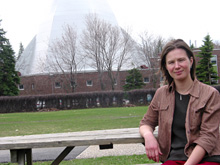
For Vasilisa Shramchenko, mathematics is an art form

Vasilisa Shramchenko
Photo by Lina Shoumarova
The time has come for Vasilisa Shramchenko to leave her cozy office on the third floor of Hingston Hall and take off for new challenges.
With her PhD in mathematical physics from Concordia, in September Vasilisa will go for six months to Bonn, Germany, to take up a Humboldt Fellowship at the prestigious Max Planck Institute for Mathematics.
Then she will go to Oxford, England, and spend two years in another coveted post-doctoral position, but first, she will visit her family and friends in St. Petersburg, Russia, the best place for her to relax and feel at home.
Vasilisa came to Concordia almost five years ago after obtaining her diploma in probability theory and statistics from St. Petersburg State University.
While she was there, she met Dmitri Korotkin, an associate professor in Concordia’s Mathematics and Statistics Department, who urged her to come and study here. He later became her doctoral supervisor.
“There are many problems in physics that are very difficult to find solutions for,” Vasilisa explained. “Mathematical physics gives you the way to search for these solutions.”
Vasilisa’s major research is connected to quantum theory and Frobenius manifolds. A manifold in mathematics is a type of space with a coordinate system, or a Euclidean space.
She put forward her findings in a paper titled “Real Doubles of Hurwitz Frobenius Manifolds” — “my first success,” as she called it. It will be published this year in the journal Communications in Mathematical Physics.
In this paper, she achieved “quite beautiful results.” Her research looks at the findings of Russian mathematician Boris Dubrovin, who invented a geometrical structure called the Frobenius manifold. Each part of the structure corresponds indirectly to a physics problem and proposes a solution for it.
Vasilisa found new structures of Frobenius manifolds, and for each of Dubrovin’s solutions, she discovered two more.
It was her father who inspired her to study mathematics. “I consider mathematics an art,” she said with a smile. “The way some people look for beauty and truth in poetry or literature, I discover beauty in mathematics.”
In Bonn and Oxford she hopes to broaden her research horizons by concentrating on new physics problems. “In mathematical physics, you never know,” Vasilisa said. “I want to spend time learning new things.”
- Lina Shoumarova
BREAKING NEWS:
It was announced today, May 5, that the Canadian Mathematical Society will award Vasilisa the 2005 Doctoral Prize for her outstanding thesis. The following is from the Society’s news release:
The reviewers refer to her work as “a great surprise” and declare that the impact and originality of her contribution is “outstanding.”
She uses an analytical approach to objects of classical algebraic geometry that stems from classical theories and is enhanced by contemporary constructions.
Besides providing a wealth of results, she poses important questions and problems, answers to which would further extend her major breakthrough in the area of Frobenius manifolds and would greatly enhance our understanding.
She has already published several papers, with more accepted for publication. She clearly has an impressive career ahead of her.